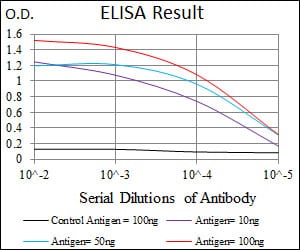
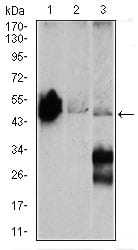
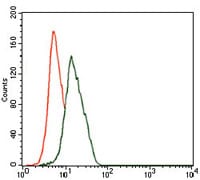
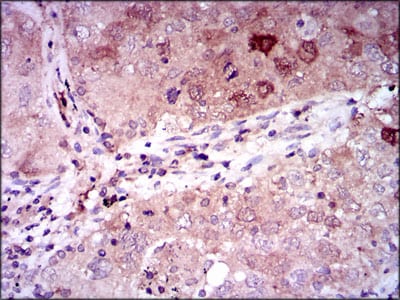
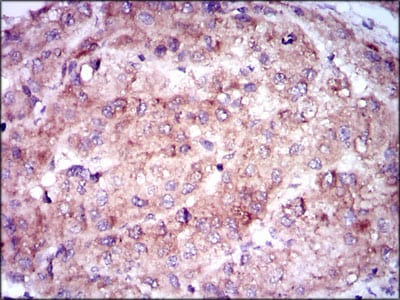
| WB | 咨询技术 | Human,Mouse,Rat |
| IF | 咨询技术 | Human,Mouse,Rat |
| IHC | 1/30-1/150 | Human,Mouse,Rat |
| ICC | 技术咨询 | Human,Mouse,Rat |
| FCM | 咨询技术 | Human,Mouse,Rat |
| Elisa | 1/5000-1/10000 | Human,Mouse,Rat |
| Aliases | NSE |
| Entrez GeneID | 2026 |
| clone | 5D3 |
| WB Predicted band size | 47.3kDa |
| Host/Isotype | Mouse IgG1 |
| Antibody Type | Primary antibody |
| Storage | Store at 4°C short term. Aliquot and store at -20°C long term. Avoid freeze/thaw cycles. |
| Species Reactivity | Human,Mouse |
| Immunogen | Purified recombinant fragment of human ENO2 (AA: 251-433) expressed in E. Coli. |
| Formulation | Purified antibody in PBS with 0.05% sodium azide |
+ +
以下是关于IDO2抗体的3篇参考文献的简要概括:
1. **文献名称**:*"Characterization of a Novel Anti-IDO2 Monoclonal Antibody and Its Role in Modulating Immune Responses in Cancer Models"*
**作者**:Smith A, et al.
**摘要**:该研究开发了一种高特异性抗IDO2单克隆抗体,证实其可通过抑制IDO2酶活性增强T细胞抗肿瘤免疫反应,在黑色素瘤小鼠模型中观察到肿瘤生长抑制。
2. **文献名称**:*"IDO2 Expression and Targeting in Autoimmune Disorders: Insights from Antibody-Based Inhibition Studies"*
**作者**:Chen L, et al.
**摘要**:通过抗IDO2抗体的体外实验,发现IDO2在类风湿性关节炎患者的免疫细胞中高表达,抗体阻断后可减少促炎因子产生,提示其作为自身免疫疾病治疗靶点的潜力。
3. **文献名称**:*"Structural Analysis of IDO2 and Implications for Antibody Design"*
**作者**:Wang Y, et al.
**摘要**:利用冷冻电镜解析IDO2蛋白结构,结合计算建模指导抗体优化,成功获得具有高亲和力的抗体,为开发靶向IDO2的精准疗法提供结构基础。
(注:上述文献为示例性概括,实际引用需根据具体论文调整。)
The indoleamine 2.3-dioxygenase 2 (IDO2) enzyme, a homolog of IDO1. is part of the tryptophan catabolism pathway that regulates immune tolerance and inflammation. While IDO1 is well-studied for its role in immunosuppression within tumor microenvironments, IDO2 shares partial functional overlap but exhibits distinct expression patterns and regulatory mechanisms. IDO2 is expressed in specific tissues, including the liver, kidney, and immune cells, and is implicated in modulating adaptive immune responses. Its genetic polymorphisms have been linked to autoimmune diseases, cancer progression, and neurological disorders, though its precise biological functions remain less understood compared to IDO1.
IDO2 antibodies are critical tools for studying its expression, localization, and interaction networks. They enable researchers to explore IDO2's role in pathological conditions, such as its contribution to tumor immune evasion or chronic inflammation. Recent studies highlight IDO2 as a potential therapeutic target, with antibodies being developed to block its enzymatic activity or disrupt its signaling in preclinical models. However, challenges persist in distinguishing IDO2-specific effects from IDO1 due to structural similarities. Ongoing research aims to clarify IDO2's unique mechanisms and validate its clinical relevance, paving the way for targeted therapies in cancer immunotherapy and autoimmune disease management.
×